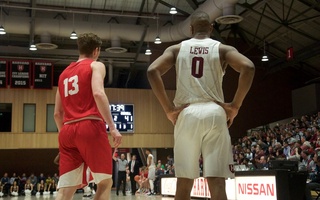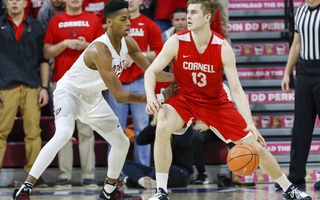{shortcode-8188e5c58f78859f873c3de3f6fbd0afff3d5e07}
The stakes have been set.
Four Ivy League men’s basketball teams—Harvard, Yale, Cornell, and host Penn—will descend on The Palestra in Philadelphia, Pa., this weekend. By Sunday afternoon, only one program will remain as the Ancient Eight’s sole representative in the NCAA Tournament.
Both semi-finals and the championship game will be broadcast on national television, a platform the Crimson (17-12, 12-2 Ivy) has experienced five times this season. A full viewing guide recap is listed below:
Saturday, March 10
No.1 Harvard vs. No.4 Cornell, 12:30 PM, ESPNU
No.2 Penn vs. No.3 Yale, 3 PM, ESPN2
Sunday, March 11
No.1 Harvard/No.4 Cornell vs. No.2 Penn/No.3 Yale, 12 PM, ESPN2
Last year’s inaugural postseason tournament benefited from rivalry storylines, with Princeton playing its nemesis, Penn, and Harvard challenging Yale. The matchups this time around may not stir up the same rancor, but will nevertheless showcase thrilling individual performances and much-anticipated rematches from a highly competitive regular season.
For top-seeded Harvard, the sole focus heading into Saturday will be on the Big Red (12-15, 6-8)—a team that the Crimson needed two overtimes to defeat on March 2 and edged by just three on Feb. 3. Junior guard Matt Morgan totaled 50 points in those two contests, most recently burying six triples in Cornell’s double overtime loss. As Harvard coach Tommy Amaker admitted, Morgan has simply been indomitable on offense.
“We have tried everything so far [defensively] and it hasn’t worked,” Amaker said. “He is a tremendous scorer. I think as we see, he can shoot and score it from all different levels. Three-point line, mid-range, at the rim. He is a lights-out foul shooter. He has just been a thorn on our side.”
Morgan commands the highest Ivy-only points per game average, at 20.5. Towns is tied in second at this category, with 18.6 PPG. On Tuesday, the Ivy League announced that the Player of the Year honor would go to the latter rather than the former, an indication that overall team performance was prioritized.
“I think it was very deserving for how [Seth] has played, how he has put us on his back in a variety of situations this year, and for being our best player,” Amaker said. “He has played exceptionally well, been incredibly efficient, and for our best player to be on the best team; a lot of times you would like to see that happen, unless someone has an extraordinary year...that’s understandable. But I do think Seth Towns was a great choice.”
The Columbus, Ohio, native has received a tremendous amount of output from supporters here in Cambridge and back home since finding out about his award on social media Tuesday.
“I was walking out of class, and my phone was blowing up,” Towns said. “ I looked, and I was like, ‘Why is everyone saying congratulations?’ We won the championship on Saturday so I don’t understand. Then I looked on Twitter and was like ‘Oh, that’s cool.’ People were proud.”
Alongside Towns, sophomore forwards Chris Lewis and Justin Bassey also earned all-Ivy recognition. Lewis was named onto the All-Ivy first team together with Towns, while Bassey earned an honorable mention award. This marks the first time since the 2014-2015 season in which three different Harvard players received all-Ivy distinctions. That season was also the last time that the Crimson appeared in the NCAA Tournament.
As for Cornell, Amaker cautioned on centering too much attention on Morgan. The other key offensive component is junior forward Stone Gettings, who finished fourth in conference scoring with 18 points per game. Unlike Lewis, who employs a traditional post-up game, Gettings has the ability to stretch the floor with a season three-point accuracy of 36.8 percent. Cornell capitalized on this disparity in both of its games against Harvard, bringing Gettings to the perimeter and forcing the Crimson’s lead blocker outside of the paint.
This theme of spacing applies even more to Morgan, whose NBA-distance three-point accuracy forces defenders like sophomore forward Justin Bassey to challenge him outside of the circle. After the last contest against Cornell, Bassey also attributed Morgan’s dangerous play to his off-the-ball movement and ability to separate from tight defenders.
This level of defensive intensity on Morgan and Gettings might entail easier opportunities for the Big Red’s supporting cast. Although three other players—juniors Steve Julian and Jack Gordon plus sophomore Josh Warren— scored in double-figures during the Big Red’s regular season finale against Dartmouth, only Morgan and Gettings scored more than 10 points in each of Cornell’s contests against Harvard.
As to the matchup on the other side of the bracket, both Penn and Yale enter the tournament playing its best basketball. After starting the season 2-4, the Bulldogs have completely turned around its season, winning five of its last six. The Quakers have also achieved this end-of-the-year mark, thanks in part to a three-point victory against the Crimson on Feb. 24. Currently, the No.2 Quakers are the bookkeeper’s tournament favorites.
To Harvard team leaders like Towns, however, these ruminations about the championship game are meaningless. Saturday’s semi-finals will be undoubtedly a challenge, one that an increasingly mature team knows it cannot overlook.
“We know it is not going to be a cupcake or cakewalk,” sophomore forward Seth Towns said, “It is going to be a tough tournament. There are four great teams in it, and we are all hungry to get to the NCAA Tournament.”
—Staff writer Henry Zhu can be reached at henry.zhu@thecrimson.com.
Read more in Sports
Softball Prepares for Pair of West Coast InvitationalsRecommended Articles
-
 Tommy Amaker Becomes Winningest Coach in Harvard Men's Basketball History With 74-66 Win Over BC
Tommy Amaker Becomes Winningest Coach in Harvard Men's Basketball History With 74-66 Win Over BC -
 Aiken Leads the Way as Men’s Basketball Closes 2016 With Win Over Howard, 67-46
Aiken Leads the Way as Men’s Basketball Closes 2016 With Win Over Howard, 67-46 -
 Towns Unable to Will Men's Basketball Past Princeton
Towns Unable to Will Men's Basketball Past Princeton -
 Notebook: Long Ball, Lewis Push Harvard Past Cornell
Notebook: Long Ball, Lewis Push Harvard Past Cornell -
 Notebook: Big Runs, Defense Help Harvard Advance to Ivy League Tournament Championship
Notebook: Big Runs, Defense Help Harvard Advance to Ivy League Tournament Championship













